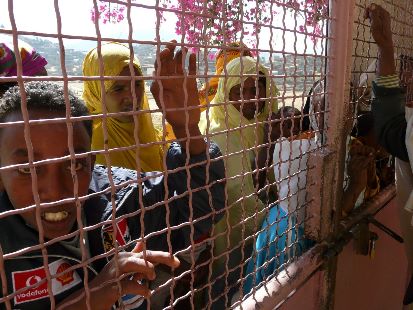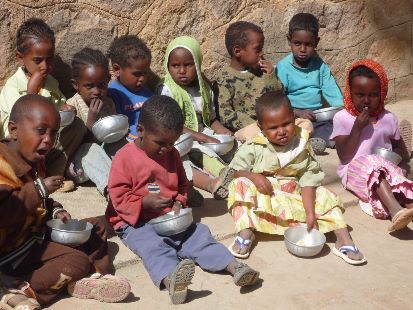Aid official describes starving Eritrean children too weak to walk
By Carmen Blanco
Catholic News Service WASHINGTON (CNS) -- A Catholic aid official who just returned from Eritrea described children too weak to walk and orphanage staffers overwhelmed by the number of children being dropped off because their families cannot feed them.
WASHINGTON (CNS) -- A Catholic aid official who just returned from Eritrea described children too weak to walk and orphanage staffers overwhelmed by the number of children being dropped off because their families cannot feed them.
"Unless you've been there and seen it, you cannot understand the gravity of the situation," Gabriel Delmonaco, U.S. national secretary for the New York-based Catholic Near East Welfare Association, told Catholic News Servicein a phone interview in mid-July. "We are trying to save one life at a time."
The worsening famine in Eritrea is prompting the Catholic Near East Welfare Association, a papal humanitarian agency, to launch an emergency appeal for $100,000 to help feed 5,000 starving families for about six months.
Nearly half of Eritrea's population is undernourished and more than 85,000 children are malnourished as a result of widespread famine, reported Amnesty International. Eritrea's 2002 drought resulted in severe water shortages and an almost complete failure of that year's harvest. Since then, rainfall has been inadequate, and last year's drought worsened conditions.
Delmonaco, who visited Eritrea in July, told CNS about the poor conditions existing in villages, orphanages and schools. The famine is particularly devastating to those living in remote villages where agriculture is the primary source of survival, he said.
During a visit to one village, Delmonaco was invited into a mother's hut, where he saw firsthand the extent to which children were suffering.
"The children were too weak to talk, too weak to walk and so weak they could not even swat the flies flying around them," he said. Delmonaco said several priests told him of their concern for the dramatic increase in number of funerals resulting from the famine.
Delmonaco said several priests told him of their concern for the dramatic increase in number of funerals resulting from the famine.
"Women, children and the elderly have been the ones most affected by the famine," he told CNS.
In one orphanage, Delmonaco noticed part of the roof was collapsing.
"Every time it rains, part of the roof comes down," he said. "And, ironically, though they have a well, the water is salty so they cannot drink it."
In the capital, Asmara, one orphanage is hosting 38 children, and in Segeneyti large numbers of orphans are being dropped off by relatives who cannot care for them.
"The sisters cannot do it. They don't know what to do," Delmonaco said.
Lack of food and water is taking a toll on one particular agricultural school. Where fields were once cultivated and the vineyard produced 30,000-40,000 bottles of red and white wine, starving livestock has halted production of milk and yogurt and wine production has ceased.
"The rector of the school said the only thing they can do is wait," Delmonaco told CNS.
After Eritrea's 1993 independence from Ethiopia, humanitarian organizations were eager to help the new country. After its 1998-2000 border war with Ethiopia, the Eritrean government adopted an absolutist regime with strict guidelines for foreigners. Some nonprofits have been expelled from the country.
Although the famine is spreading, news about it is not. Delmonaco said he noticed little representation of foreign media in the country, with those present restricted to Asmara. He told CNS that internal movement within the country is very difficult because of the numerous military checkpoints.
The money Catholic Near East raises will be distributed to Catholic networks that will provide families with small grants to buy food. One hundred dollars can buy 100 pounds of sorghum, a replacement for grain that is resilient to the drought.
"It can provide energy and nutrition and allow a family to survive for three months," Delmonaco said.
He said the agency's humanitarian effort is modest but "at the moment, about 1,000 families are in critical condition, and they will die if they don't immediately receive help."
Founded in 1926 by Pope Pius XI, Catholic Near East Welfare Association is an agency of the Vatican providing support to the churches and peoples of the Middle East, Northeast Africa, India and Eastern Europe. Its works include care for needy children; religious formation sponsorship programs; village redevelopment projects; health care and education; and public awareness and interreligious dialogue activities.
Editor's Note: The Catholic Near East Welfare Association accepts donations for the Emergency Eritrea project through the mail and its Web site: http://www.cnewa.org/generalpg-verus.aspx?pageID=445. CNEWA's address is: 1011 First Ave., 15th Floor, New York, NY 10022-4195.


![[AIM] Asmarino Independent Media](/images/logo/ailogo.png)